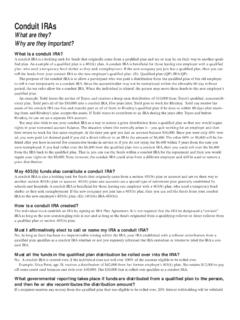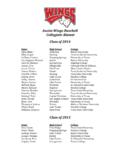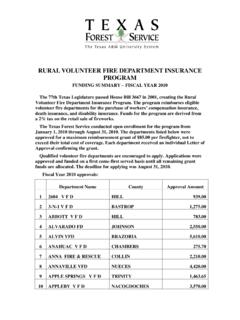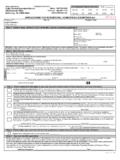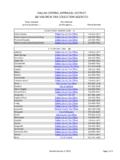Transcription of Compliance With Regulation E By HSAs - Loretto, Minnesota
1 collin W. Fritz and Associates, Inc., The Pension Specialists June 2010 Published Since 1984 ALSO IN THIS ISSUE What is the Future of CESAs?,Page 2 Special RMD Rule Whenthe Nonspouse InheritingBeneficiary is Older Than theDeceased IRA Accountholder,Page 4We all Make Mistakes,Including IRA and HSAO wners Who AreAccountants or Attorneys,Page 5 Completing and Filing the2009 Form 5500-EZ, Page 6 IRS Form 5500-EZ, Page 9 2010 collin W. Fritz and Associates, is not claimed in any materialsecured from official Governmentsources. Published by collin W. Fritz andAssociates, Ltd. Subscription: $95 per With Regulation E By HSAs Regulation E is concerned withElectronic Fund Transfers.
2 The FederalReserve Board has adopted final regula-tions pertaining to certain overdraft serv-ices and fees. These regulations changeRegulation E and Regulation DD. Theterm overdraft service means a serviceunder which a financial institutionassesses a fee or charge on a consumer saccount held by the institution for payinga transaction when the consumer hasinsufficient or unavailable funds in theaccount. The purpose of this article is to discusswhen, if and how the new Regulation Erules apply to HSAs. The purpose of thenew rules is to define when it is permis-sible for a financial institution to chargefees with respect to overdraft situationsarising from certain ATM and one-timedebit card transactions.
3 In general, thechanges to Regulation E will not impactthose financial institutions serving as theHSA custodian since the HSA custodianshould never authorize the payment ofan HSA transaction resulting in a nega-tive balance. The effect of the covering isthat the institution has made a loan to theHSA and, although short-term, there willbe a prohibited transaction. The final rules adopt the followingrequirements with respect to certain reg-ulation E transactions. The first rule is that consumers arerequired to affirmatively agree in writingto the financial institution's overdraftservices/fees for ATM and for one-timedebit card transactions.
4 The financialinstitution is not allowed to charge anyoverdraft fees or similar fees until theconsumer consents in writing. Theserules do not apply to check transactions,recurring debits, or ACH transactions. The second rule is that the financialinstitution is required to furnish a con-sumer with a written notice on a peraccount basis explaining the institution soverdraft policies and services. The con-sumer must be given a reasonable oppor-tunity to affirmatively consent or elect inwriting to use the overdraft service withrespect to the specific account. If no suchelection is made, then the financial insti-tution has no authority to charge its over-draft fees or similar fees (daily negativebalance fees, nonsufficient funds fee,sustained overdraft fees, etc.)
5 Although not covered in the final regu-lation, the Federal Reserve believes, ingeneral, that the charging of a fee for theinstitution's declining a transaction withrespect to the overdrawing the accountfor ATM and one-time debit card trans-actions most likely is also not permittedbecause of Compliance concerns relatedto the Fair Trade Commission Act. Thereasoning there is little cost or risk tothe institution when it declines to author-ize the payment of an ATM or one-timedebit card transaction. An HSA custodian will need to decidewhether it will take the strong suggestionof the Federal Reserve and not charge afee when it decides to not authorize aone-time HSA debit card transaction or Continued on page 2 June 2010 Page 2whether it will charge such a fee.
6 If such a fee will becharged, CWF recommends that a notice be furnishedexplaining how and when the fee will be imposed. These new Regulation E rules apply as of July 1,2010. For accounts opened before July 1, 2010, thefinancial institutions may charge such overdraft fees onor after August 15, 2010, only if the consumer hasexpressly elected in writing to have such service per-formed with respect to an ATM or one-time debit cardtransaction. For accounts opened after July 1, 2010, thefinancial institutions may charge such overdraft feesonly if the consumer has expressly elected in writing tohave such service performed with respect to an ATM orone-time debit card transactions.
7 Thirdly, if the consumer elects to use this service,then the financial institution must provide a separatewritten confirmation to the consumer. In addition, suchconfirmation must inform the consumer of his or herright to revoke this election. Exception. A financial institution that does not chargeany overdraft fees even in situations when the institu-tion is unable to avoid paying an item that overdrawsthe account ( intervening transactions) and whichhas a policy and procedure of declining to authorizeand pay ATM and/or one time debit card transactions isnot required to furnish the notice and obtain theexpressed election by the consumer.
8 In summary, most financial institution will not pay orcover an NSF situation for an HSA since to do so willbe a prohibited transaction. The proposed transactionmust be declined by the financial institution. This istrue whether it be a check transaction or an HSA one-time debit card transaction. Since the financial institu-tion will generally not pay a proposed NSF transaction,there is no need for a financial institution to furnish theRegulation E notice and to obtain an affirmative elec-tion from the HSA owner. However, the law is not set-tled whether or not a financial institution can assess afee for declining to authorize the payment of an HSAtransaction via an ACH transaction or a one-time debitcard transaction.
9 The Federal Reserve does not wantfinancial institutions to charge such fees. If an institu-tion chooses to charge such a fee, it will want to fullyexplain the fee by furnishing a notice. What is the Future of CESAs?The status of Coverdell Education Savings Accounts(CESAs) is very unsettled and so is the future of theseaccounts. In June of 2001, President Bush signed the EconomicGrowth and Tax Relief Reconciliation Act of 2001(EGTRRA). Initially, the law changes were to apply onlyto 2002-2010. Some provisions of EGTRRA were madepermanent ( the IRA and pension law changes)
10 Unlessthere would be a future repealing is currently deadlocked on many relate to whether or not to extend or make perma-nent those law changes made by EGTRRA which havenot yet been made permanent or CESA laws for 2011 will revert to be the laws ineffect in 2001 unless there is a tax law extending the2001 law The contribution limit will be $500 per child ratherthan $2,000 per An individual will no longer be able to make a car-ryback CESA contribution by April 15 of the follow-ing year, A 2011 contribution would have to bemade by December 31, A married person filing a joint income tax return for2011 is eligible to make a $500 per child contribu-tion if their joint income is less than $150,000, nocontribution if their joint income is more than$160,000 and a prorated contribution is theirincome is between $150,000 and $160,000.
